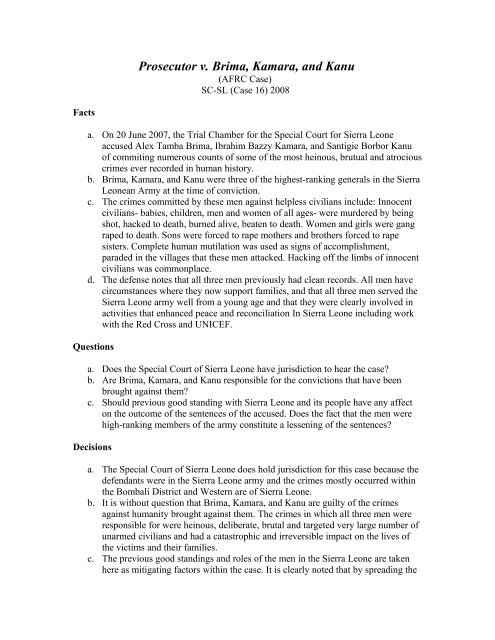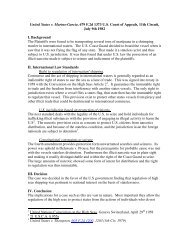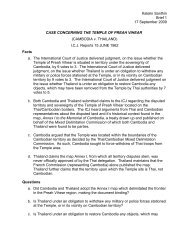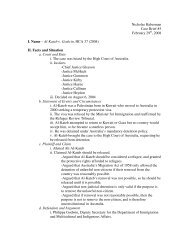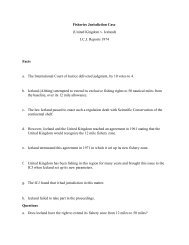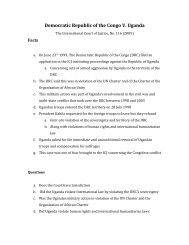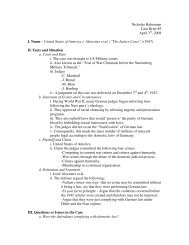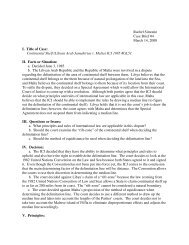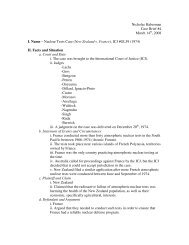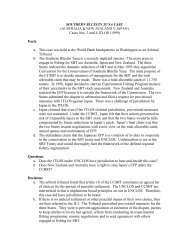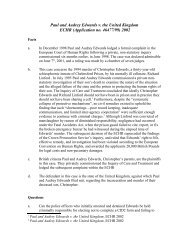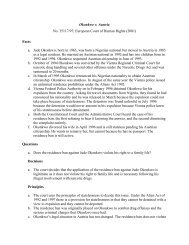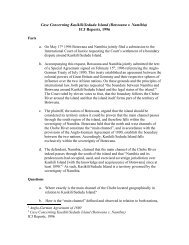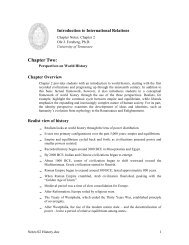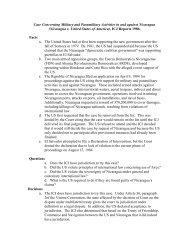Prosecutor v. Brima, Kamara, and Kanu - Courses
Prosecutor v. Brima, Kamara, and Kanu - Courses
Prosecutor v. Brima, Kamara, and Kanu - Courses
Create successful ePaper yourself
Turn your PDF publications into a flip-book with our unique Google optimized e-Paper software.
<strong>Prosecutor</strong> v. <strong>Brima</strong>, <strong>Kamara</strong>, <strong>and</strong> <strong>Kanu</strong><br />
(AFRC Case)<br />
SC-SL (Case 16) 2008<br />
Facts<br />
a. On 20 June 2007, the Trial Chamber for the Special Court for Sierra Leone<br />
accused Alex Tamba <strong>Brima</strong>, Ibrahim Bazzy <strong>Kamara</strong>, <strong>and</strong> Santigie Borbor <strong>Kanu</strong><br />
of commiting numerous counts of some of the most heinous, brutual <strong>and</strong> atrocious<br />
crimes ever recorded in human history.<br />
b. <strong>Brima</strong>, <strong>Kamara</strong>, <strong>and</strong> <strong>Kanu</strong> were three of the highest-ranking generals in the Sierra<br />
Leonean Army at the time of conviction.<br />
c. The crimes committed by these men against helpless civilians include: Innocent<br />
civilians- babies, children, men <strong>and</strong> women of all ages- were murdered by being<br />
shot, hacked to death, burned alive, beaten to death. Women <strong>and</strong> girls were gang<br />
raped to death. Sons were forced to rape mothers <strong>and</strong> brothers forced to rape<br />
sisters. Complete human mutilation was used as signs of accomplishment,<br />
paraded in the villages that these men attacked. Hacking off the limbs of innocent<br />
civilians was commonplace.<br />
d. The defense notes that all three men previously had clean records. All men have<br />
circumstances where they now support families, <strong>and</strong> that all three men served the<br />
Sierra Leone army well from a young age <strong>and</strong> that they were clearly involved in<br />
activities that enhanced peace <strong>and</strong> reconciliation In Sierra Leone including work<br />
with the Red Cross <strong>and</strong> UNICEF.<br />
Questions<br />
a. Does the Special Court of Sierra Leone have jurisdiction to hear the case<br />
b. Are <strong>Brima</strong>, <strong>Kamara</strong>, <strong>and</strong> <strong>Kanu</strong> responsible for the convictions that have been<br />
brought against them<br />
c. Should previous good st<strong>and</strong>ing with Sierra Leone <strong>and</strong> its people have any affect<br />
on the outcome of the sentences of the accused. Does the fact that the men were<br />
high-ranking members of the army constitute a lessening of the sentences<br />
Decisions<br />
a. The Special Court of Sierra Leone does hold jurisdiction for this case because the<br />
defendants were in the Sierra Leone army <strong>and</strong> the crimes mostly occurred within<br />
the Bombali District <strong>and</strong> Western are of Sierra Leone.<br />
b. It is without question that <strong>Brima</strong>, <strong>Kamara</strong>, <strong>and</strong> <strong>Kanu</strong> are guilty of the crimes<br />
against humanity brought against them. The crimes in which all three men were<br />
responsible for were heinous, deliberate, brutal <strong>and</strong> targeted very large number of<br />
unarmed civilians <strong>and</strong> had a catastrophic <strong>and</strong> irreversible impact on the lives of<br />
the victims <strong>and</strong> their families.<br />
c. The previous good st<strong>and</strong>ings <strong>and</strong> roles of the men in the Sierra Leone are taken<br />
here as mitigating factors within the case. It is clearly noted that by spreading the
peace <strong>and</strong> sometimes helping civilians, the men were doing their responsibilities<br />
within the country.<br />
d. Therefore, with these heinous, brutal <strong>and</strong> targeted attack on unarmed civilians in<br />
mind, the SC-SL has convicted all three men to acceptable prison terms with the<br />
principle that an appropriate penalty must be imposed in proportion with the<br />
wrongdoing. The Trial Chamber, for these reasons, sentences Alex Tamba <strong>Brima</strong><br />
to a single term of fifty years in prison, sentences Ibrahim Bazzy <strong>Kamara</strong> to a<br />
single term of forty five years in prison, <strong>and</strong> sentences Santigie Borbor <strong>Kanu</strong> to a<br />
single term of fifty years in prison.<br />
Principles<br />
a. The key principle in this case was the recognition of crimes against humanity. The<br />
crimes committed were viewed as some of the most tragic <strong>and</strong> outrageous crimes<br />
ever committed in human history.<br />
b. The court foremost wanted to convey the message that globally accepted laws <strong>and</strong><br />
rules have to be obeyed by everybody.<br />
Conclusion<br />
With undisputable evidence placed on these men for unthinkable crimes against<br />
humanity, they were all rightfully sentenced to prison terms. It was the men’s duty to<br />
keep the peace within Sierra Leone, but they rather committed heinous crimes against<br />
humanity.<br />
Bibliography<br />
<strong>Prosecutor</strong> vs. <strong>Brima</strong>, <strong>Kamara</strong> <strong>and</strong> <strong>Kanu</strong> (AFRC Case); SC-SL (Case 16) 2008<br />
Submitted<br />
John W. Hoy, 19 November 2009


